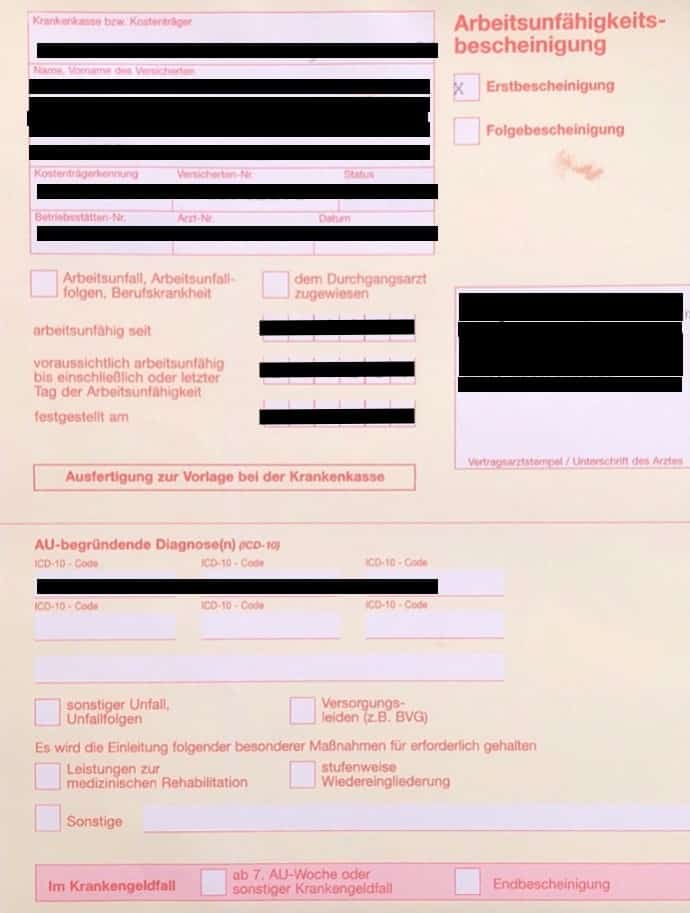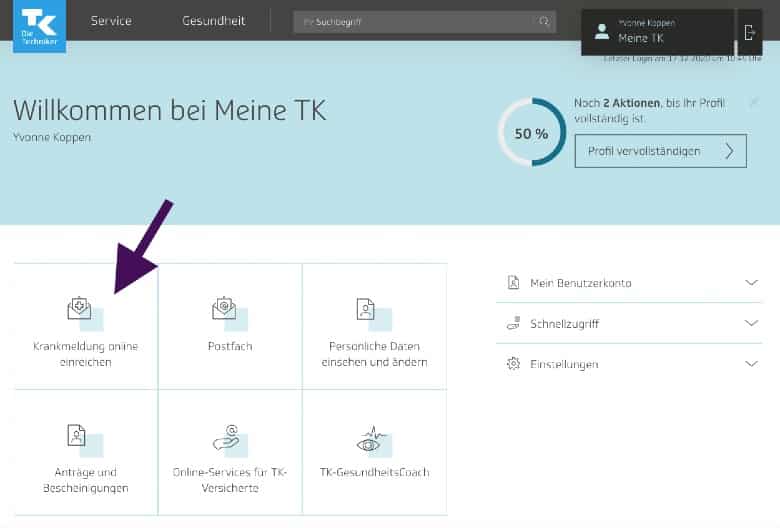Calling in sick as an employee is often the last resort in other countries, as it gets frowned upon by employers or risks your financial stability, not so in Germany. Paid sick leave in Germany is one of the many social securities you can benefit from as an employee who is part of the public healthcare system.
In Germany, the general belief is that if you are sick (even with a cold), you should rather stay at home and get well faster than drag yourself through prolonged sickness (because your body can’t rest) while performing at less than 100% and possibly contageing colleagues.
In this guide, we will tell you everything you need to know about sick leave in Germany. When it applies, how much financial support you get, and what processes to follow.
Does Germany have paid sick leave?
Yes, as an employee in Germany, you benefit from paid sick leave. If you are sick and unable to work for up to six weeks, your employer continues to pay your full salary, known as continued remuneration (Entgeldfortzahlung). However, if you have just started a job in a new company and you fall sick within the first four weeks, your employer does not have to keep on paying you. In this case, you can request sick pay from your public health insurance.
If you are on sick leave for more than six weeks due to the same illness, publicly insured employees have the right to receive sick pay (Krankengeld). You can get Krankengeld for a maximum of 72 weeks. It does not matter whether your sick leave is due to physical or mental illness.
If you are privately insured, you cannot claim sick pay; instead, you can claim your daily sickness allowance (Krankentagegeld) if it is part of your tariff. Ottonova, the only English-speaking private health insurance in Germany, offers daily sickness allowance as part of their tariffs.
If you are self-employed or a freelancer, you will need to cover financial losses during your illness yourself. This is why it is even more important if you are privately insured to get a tariff with a daily sickness allowance.
Read Our Related Guide
How much is sick pay (Krankengeld) in Germany?
How much sick pay you are entitled to depends on your circumstances and salary. It usually is the lower amount of either 70% of your gross monthly salary or 90% of your monthly net salary. Social contributions such as unemployment insurance, long-term care, and pension insurance will still be subtracted from your sick pay. You can calculate the amount you would receive as sick pay via this calculator.
However, there is a maximum amount of Krankengeld set per day of 112,88 euros gross, which leads to 3.386 euros gross per month. After subtracting your social contributions, however, the maximum amount of net sick pay you can get in 2022 is 2.979 euros a month, regardless of whether your monthly salary is exponentially higher.
How many sick days do you get a year in Germany?
As per one of the most prominent worker unions in Germany, your employer has to accept up to 30 sick days a year. Any sick leave lasting more than 30 days can be seen as unreasonable, especially if it repeats several years in a row. This could be a reason to get fired.
How many days can you be sick without a doctor’s note?
By law, you need to provide a doctor’s note latest after three days of calling in sick, so on the fourth working day. However, companies can shorten this period in your work contract. So be sure to read the section talking about Arbeitsunfähigkeit, as it is common for the time to be reduced to one or two sick days. When you call in sick, your employer can also request a sick note for the same day; however, we have never personally experienced such practice.
3 steps to call in sick in Germany?
To receive all the benefits described above, it is crucial that you follow the three steps below on how to call in sick in Germany.
1. Inform your employer
You need to inform your employer immediately when you are unable to work. Most companies have a process for that, and it usually involves that you inform your supervisor or HR department. Legally, there is no one form to use; you could call, email, or text. Ideally, you ask your supervisor about the preferred method in your first months at work.
2. Go to a doctor
Depending on the severity of your illness, you should visit a doctor and, if need be, get a sick note.
3. Send a sick note to employer and health insurance
The sick note (Arbeitsunfähigkeitsbescheinigung 🙈) is also called yellow note (gelber Schein), as it is indeed yellow or Krankmeldung. It comes in three different versions. One for your health insurance, which indicates the diagnosis, one for your employer, which doesn’t indidcate the diagnosis, and a copy for your records. The one for the health insurance will state in bold letters ‘Ausfertigung zur Vorlage bei der Krankenkasse’ and the one for the employer ‘Ausfertigung zur Vorlage beim Arbeitgeber’.

You need to send the sick note to both parties at your earliest convenience and within a maximum of one week to keep your right to receive Krankengeld. An email to the employer is accepted; however, it is better to hand in the original when you get back to work as well. Most health insurances offer the option to upload a picture or scan of the sick note in your member area. TK has it as quick access on the welcome page.

If you have private health insurance, you only need to inform your insurance of your sick note if you have the right for Krankentagegeld as part of your tariff. If you get asked to send the sick note via postal mail, you can read our guide on how to send a letter.
To sign up with Techniker Krankenkasse, follow this super fast sign-up form provided by expat insurance specialist Feather.
Since October 2021, the sick note process is slowly getting digitalized. The first step is that your doctor will digitally transmit the sick note to the health insurance. The next step, which will be implemented in 2022, is that the health insurance gives access to the sick note information to the employer. Until the end of June 2022, all doctors must still hand out the sick note to you and you should still follow the above process.
What are you allowed to do during a sick leave in Germany?
You are allowed to do anything during your sick leave, which does not hinder your healing process. Here are a few examples of what you are allowed to do:
- Go for a walk
- Go grocery shopping
- Go to the movies
- Travel if it helps you recover (e.g., a trip to the ocean or a place with thermal waters helps to recover asthma or bronchitis)
You can also go back to work before your sick leave ends if you and your employer agree that you have recovered.
It is common sense that you should not be seen partying, drinking, or with any other excessive behavior.
How much is annual leave in Germany?
By law, the annual leave in Germany is a minimum of 20 days if you are working five days a week and 24 days if you are working six days a week. However, 30 vacation days are quite usual in Germany. On average, employees in Germany have 28 days of annual leave.
If you fall sick during your vacation, you can claim them as sick days and save your vacation days. In this case, you need to submit a sick note to your employer on the first day of sickness. Vacation days are meant to help you relax and unwind from any stress at work; recovering from an illness is not part of that.
Read Our Related Guide
Conclusion
We hope that this guide showed you that it is ok to be sick in Germany and not work. Paid sick leave is one of the many employee rights in Germany, which makes Germany an attractive place to live and work.





